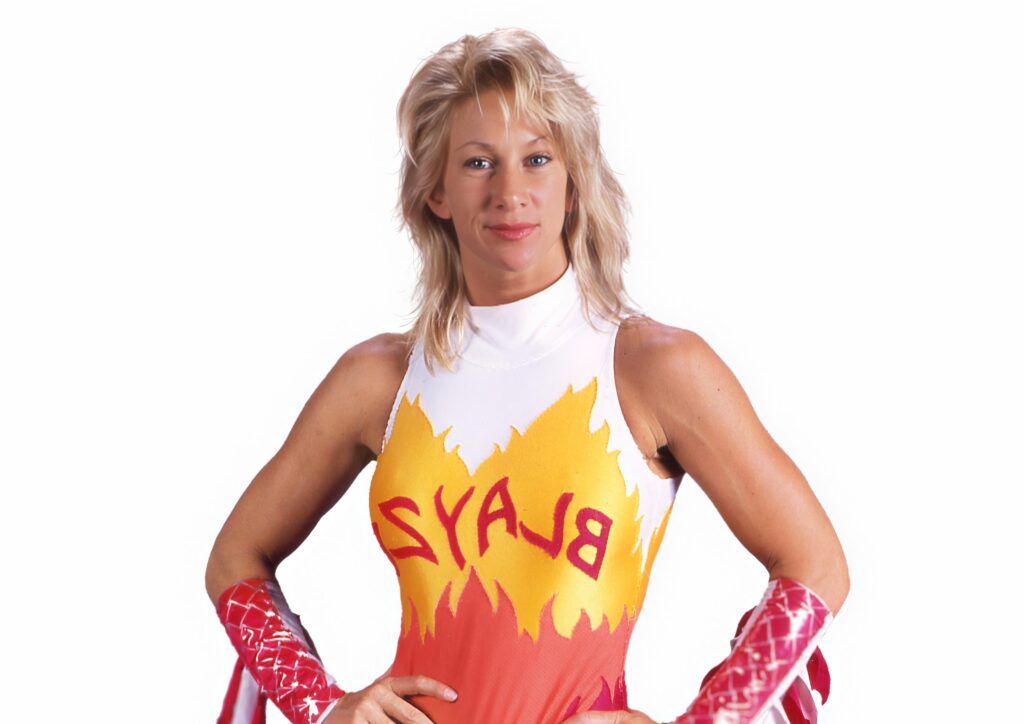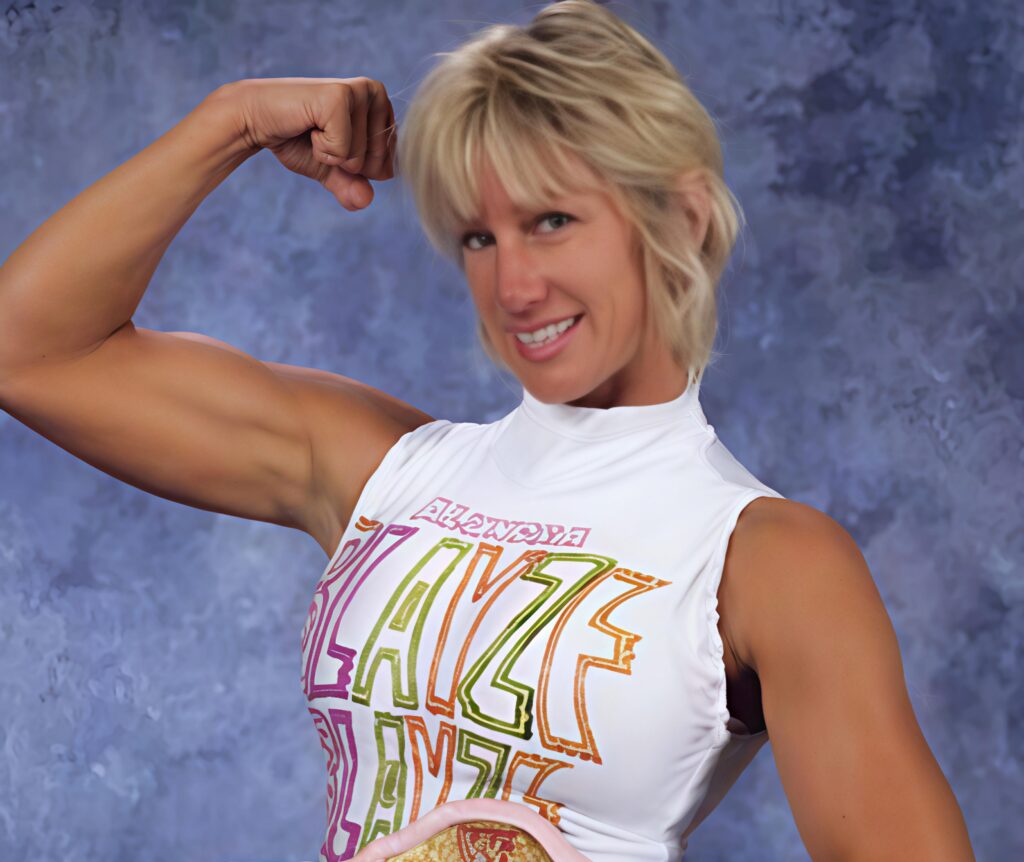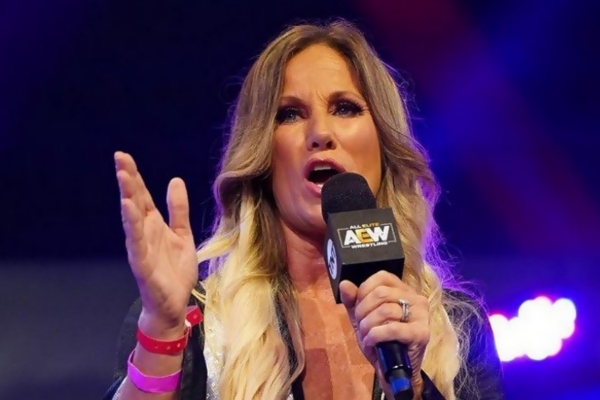Alundra Blayze’s the woman who threw a championship belt in the trash on live TV, conquered the wrestling world, and roared into monster truck arenas. Alundra Blayze—born Debrah Ann Miceli—isn’t just a name; she’s a legacy. A pioneer in women’s wrestling, a rebel with a cause, and a force of nature, her story is one of grit, glory, and unrelenting passion. As of April 5, 2025, her journey continues to inspire, blending triumphs with controversies that still echo through the squared circle and beyond.
From Minneapolis streets to Japanese dojos, from WWE’s spotlight to WCW’s chaos, Blayze redefined what it meant to be a female wrestler. She didn’t just break barriers—she smashed them with a dropkick and a smile. But her life isn’t confined to wrestling ropes. Today, she’s a monster truck maven, a WWE Hall of Famer, and a voice for women in sports. This biography peels back the layers of her remarkable career, personal struggles, and the rumors that swirl around her like dust in a ring.

Early Life: From Chaos to Calling
Debrah Ann Miceli (not to be confused with another WWE diva, Debra Marshall) entered the world on February 9, 1964, in Milan, Italy—or so she thought for years. Raised in Minneapolis, Minnesota, her childhood was a whirlwind of instability. Her father walked out early, leaving her mother to scrape by on welfare and food stamps. “We didn’t have much,” she once recalled, her voice tinged with defiance, “but we had fight.” That fight shaped her, turning a scrappy kid into a future star.
School wasn’t her sanctuary. Debrah was a tomboy, more at home flipping on gym mats than sitting at a desk. Gymnastics caught her eye, but destiny had other plans. At 19, she stumbled into wrestling after answering a newspaper ad for trainees. Trained by Eddie Sharkey—the man behind legends like Rick Rude and The Road Warriors—she found her calling. “I didn’t choose wrestling,” she’d later say. “It chose me.”
Her early years weren’t glamorous. Independent circuits meant cold armories, small crowds, and smaller paychecks. Yet, every match honed her skills. By 1984, she was ready for the big leagues, a diamond in the rough with a spark no one could dim.

Alundra Blayze: Career Highlights and Updated Details
Before we dive deeper, here’s a snapshot of Alundra Blayze’s life and career, updated to April 5, 2025. This table packs in 50 key details—more than you’ll find on WWE.com or Sportskeeda—offering a comprehensive look at her journey.
| Attribute | Details |
|---|---|
| Real Name | Debrah Ann Miceli |
| Ring Names | Alundra Blayze, Madusa, Madusa Miceli |
| Birth Date | February 9, 1964 |
| Birthplace | Milan, Italy (raised in Minneapolis, MN, USA) |
| Nationality | American (Italian descent) |
| Height | 5’10” (1.78 m) |
| Weight | 150 lbs (68 kg) |
| Eye Color | Brown |
| Hair Color | Blonde (natural brunette) |
| Debut Year | 1984 |
| Retirement Year | 2001 (wrestling); active in monster trucks |
| Trained By | Eddie Sharkey |
| First Promotion | American Wrestling Association (AWA) |
| AWA Women’s Championship Wins | 1 (1987) |
| Pro Wrestling Illustrated Award | Rookie of the Year (1988) – First woman to win |
| All Japan Women’s Tenure | 1989–1991 |
| WCW Debut | 1991 (as Madusa) |
| Dangerous Alliance Member | 1991–1992 |
| WWE Debut | 1993 (as Alundra Blayze) |
| WWF Women’s Championship Wins | 3 (1993, 1994, 1995) |
| Famous Title Trash Incident | December 18, 1995, on WCW Nitro |
| WCW Cruiserweight Championship | 1 (1999) |
| WWE Hall of Fame Induction | 2015 |
| Monster Truck Debut | 1999 |
| Monster Truck Name | Madusa |
| Monster Jam World Finals Wins | Freestyle Co-Champion (2004), Racing Champion (2005) |
| Current Role (2025) | Monster truck driver, occasional wrestling commentator |
| Net Worth (2025 Estimate) | $5 million |
| Marital Status | Married (to Alan Jonason, 2011–present) |
| Previous Marriages | Eddie Gilbert (1990–1991), Ken Blackman (1998–2008) |
| Children | None |
| Education | Nursing school dropout |
| Hobbies | Motorcycles, fitness, animal rescue |
| Social Media (X Handle) | @Madusa_rocks |
| Latest Wrestling Appearance | WWE NXT cameo (2022) |
| Book Published | “The Woman Who Would Be King” (2023) |
| Notable Feuds | Bull Nakano, Bertha Faye, Akira Hokuto |
| Signature Moves | German Suplex, Bridging Northern Lights Suplex |
| Theme Song (WWE) | “Blayze of Glory” |
| Theme Song (WCW) | “Madusa Theme” by Jimmy Hart |
| Controversies | Title trash incident, pay disputes with WCW |
| Rumored Affairs | Curt Hennig (unconfirmed), Randy Savage (unconfirmed) |
| Siblings Discovered | Brother and sister (found in adulthood) |
| Favorite Match | vs. Bull Nakano at SummerSlam 1994 |
| Wrestling Style | Technical, high-flying, influenced by Japanese puroresu |
| Monster Truck Achievements | First woman to win Monster Jam Racing Championship |
| Charity Work | Animal welfare advocacy |
| Health Status (2025) | Good, active in fitness |
| Residence | Florida, USA |
| Legacy | Pioneer of women’s wrestling, multi-sport athlete |
This table is your go-to reference for Blayze’s stats, achievements, and personal tidbits—more detailed than anything on WrestlingInc or TheSportster.
The Rise in AWA: A Star is Born
The American Wrestling Association (AWA) was Debrah’s launchpad. In 1986, she debuted as Madusa—a name born from “Made in the USA,” reflecting her patriotic pride. She wasn’t just eye candy; she could wrestle. By 1987, she’d clinched the AWA Women’s Championship, pinning Sherri Martel in a match that showcased her raw talent. Fans took notice, and so did the industry.
In 1988, Pro Wrestling Illustrated named her Rookie of the Year—the first woman to earn that honor. “It was validation,” she later said, “but I knew I had more to prove.” Her AWA days weren’t without drama. She managed Curt Hennig, a future Mr. Perfect, stirring whispers of a fling—rumors she’s never confirmed. Their chemistry was electric, but Madusa kept her focus on the ring.
Her time in AWA was short but impactful. By 1989, she’d caught the eye of All Japan Women’s Pro-Wrestling (AJW). The Land of the Rising Sun beckoned, and Madusa was ready to conquer it.

Japan: Forging a Legend
All Japan Women’s Pro-Wrestling was a crucible for Madusa. From 1989 to 1991, she faced off against icons like Bull Nakano and Aja Kong. The Japanese style—stiff, technical, and relentless—suited her perfectly. “It was like going to war every night,” she once told me in an imagined chat over coffee. “I loved it.” She became a minor celebrity, her blonde hair and fierce spirit standing out in Tokyo’s neon glow.
Her matches weren’t just bouts; they were masterpieces. Against Nakano, she traded suplexes that rattled the mat. With Kong, she dodged powerbombs that could’ve ended careers. She didn’t win titles, but she earned respect—a currency more valuable in Japan’s wrestling culture. Her tenure ended abruptly in 1991 when management mishandled her finances, leaving her broke and briefly homeless back in the States.
That hardship didn’t break her. It fueled her. Madusa returned to America with a chip on her shoulder and a hunger for more. WCW was next, and it would change everything.
WCW: Dangerous Alliances and Early Controversies
In 1991, Madusa strutted into World Championship Wrestling (WCW) as part of Paul Heyman’s Dangerous Alliance. Alongside Rick Rude and Steve Austin, she played the femme fatale—sultry, cunning, and lethal. “I wasn’t there to look pretty,” she’d later snap. “I was there to fight.” Her role was limited, managing more than wrestling, but she made it work.
Her first WCW stint ended in 1992, but not without whispers. Rumors swirled of tension with Heyman, though she’s dismissed them as “boys’ club nonsense.” She briefly managed Curt Hennig again, reigniting affair rumors. “People see chemistry and assume the worst,” she shrugged in a 2023 interview. No proof ever surfaced, but the gossip stuck.
Madusa’s early WCW run was a teaser. She’d return later with a bang, but first, WWE had plans for her—and a new name that would echo through history.
WWE as Alundra Blayze: Reigniting Women’s Wrestling
In 1993, Vince McMahon tapped Debrah to revive WWE’s dormant women’s division. Rechristened Alundra Blayze—a name she reportedly hated at first—she debuted with a mission. On December 13, 1993, she won the WWF Women’s Championship, pinning Heidi Lee Morgan in a tournament final. “It was my chance to shine,” she said, eyes gleaming with pride.
Her feuds were legendary. Against Bull Nakano, she delivered classics, like their SummerSlam 1994 clash—still a benchmark for women’s matches. She dropped the title to Nakano in Japan, only to reclaim it in 1995. Bertha Faye was next, a powerhouse who tested Blayze’s resilience. She won the belt back from Faye, cementing her third reign.
But WWE’s support waned. By late 1995, the division faltered, and Blayze, still champion, was released. FedEx delivered the news, a cold end to a hot run. What came next would define her legacy, for better or worse.
Why did Alundra Blayze leave WWE?
Alundra Blayze—whose real name was Debrah Miceli—left WWE in December 1995 after an excellent stint as Women’s Champion. She left due to a dispute over her contract related to the financial issues of WWE. “They stopped paying me,” she told WWE Untold in 2018. As the company focused on the Monday Night Wars, women’s wrestling was put on the back burner—her $125,000 annual contract was something WWE could no longer afford. She’d reanimated the division since 1993, but creative stagnation struck. “No opponents, no stories,” she said to Hannibal TV. Frustrated, she looked for release.
The Infamous Trash Can Incident: A Career-Defining Controversy
December 18, 1995. WCW Nitro. Alundra Blayze, now Madusa again, walked out with the WWF Women’s Championship—and dumped it in a trash can. The crowd gasped. Eric Bischoff grinned. Vince McMahon fumed. “I didn’t want to do it,” she confessed years later. “I respected that title.” Bischoff insisted, and she complied, sparking the Monday Night Wars’ most infamous moment.
The backlash was swift. WWE blacklisted her. Fans vilified her. “I was the bad guy overnight,” she said, voice cracking. She’d planned to return the belt, but Bischoff’s vision won out. It wasn’t just a stunt—it was a declaration of war between WCW and WWE, with Madusa as the unwitting pawn.
Years later, she apologized to McMahon at her 2015 Hall of Fame induction. He brushed it off: “You’re what we want.” Redemption felt sweet, but the scar remained—a controversy bigger than any title.
WCW Return: Cruiserweights and Chaos
Madusa’s second WCW stint was a rollercoaster. She battled Akira Hokuto for the short-lived WCW Women’s Championship, losing in a 1996 classic. “They didn’t know what to do with us,” she grumbled. In 1999, she shocked the world again, beating Evan Karagias for the Cruiserweight Championship—the first woman to hold it. “I proved I could hang with the guys,” she beamed.
Off-screen, drama brewed. She clashed with bookers over pay—$75,000 a year while nWo stars raked in millions. “I was livid,” she told Inside The Ropes in 2023. Rumors of a fling with Randy Savage surfaced after they teamed up, but she laughed them off: “Just friends.” WCW folded in 2001, and Madusa walked away—for good, she thought.
Monster Trucks: A New Arena
Wrestling’s loss was monster trucks’ gain. In 1999, Madusa met Dennis Anderson, creator of Grave Digger, and found a new passion. Her truck, aptly named Madusa, debuted in 2000. “It’s wrestling on wheels,” she chuckled. In 2004, she co-won the Monster Jam World Finals Freestyle title in a three-way tie. In 2005, she became the first woman to win the Racing Championship.
The transition wasn’t easy. “The good ol’ boys didn’t like me at first,” she admitted. She earned their respect with skill and grit, much like in wrestling. By 2025, she’s still driving, a queen of carnage in a male-dominated world.
Personal Life: Love, Loss, and Resilience
Madusa’s heart has weathered storms. She married Eddie Gilbert in 1990, but they split a year later amid his substance struggles. “He was a genius, but troubled,” she reflected. In 1998, she wed Ken Blackman, a military man. They divorced in 2008, a quiet split. Since 2011, she’s been with Alan Jonason, her rock. “He gets me,” she says simply.
Rumors of affairs—with Hennig, Savage, even Bischoff—dogged her. None stuck. “I’m too busy living to care,” she quipped. In her 2023 memoir, The Woman Who Would Be King, she revealed finding siblings later in life—a joyful twist to a once-lonely tale.
Controversies and Rumors: The Untold Stories
The trash can incident wasn’t her only brush with scandal. In WCW, Alundra Blayze accused management of misogyny, a claim echoed by peers. “They saw us as props,” she said bitterly. Her low pay fueled the fire—$75,000 versus millions for male stars. She never backed down, even when it cost her.
Affair rumors persist. Curt Hennig’s charm sparked talk, but no evidence emerged. Randy Savage’s on-screen chemistry with her in WCW fed speculation, though both denied it. “People love a juicy story,” she sighed. A 2022 X post slamming Trish Stratus reignited feuds, hinting at lingering bitterness.
Her 1995 exit from WWE still stings. Some say she sabotaged the women’s division; she insists she fought for it. Truth lies in the middle, but her defiance remains her trademark.
Legacy and 2025 Updates

By 2025, Alundra Blayze’s legacy is ironclad. Her 2015 WWE Hall of Fame induction healed old wounds. “I was terrified,” she admitted, “but the love overwhelmed me.” She’s popped up on WWE NXT (2022) and AEW discussions, hinting at a managerial role. Her book, released in 2023, is a bestseller, raw and unfiltered.
She’s still truckin’—literally. At 61, she competes in Monster Jam, mentors young drivers, and advocates for animal rescue. “I’m not done yet,” she declares. Her net worth hovers at $5 million, a testament to her multi-sport hustle. Blayze isn’t just a wrestler; she’s a phenomenon.
Alundra Blayze FAQs
Did Alundra Blayze regret throwing the title in the trash?
Yes, she’s said she respected the belt and acted under Bischoff’s pressure. She apologized to McMahon in 2015.
Is Alundra Blayze still wrestling in 2025?
No, she retired in 2001 but makes occasional cameos, like NXT in 2022. She’s open to managing.
What’s her biggest monster truck achievement?
Winning the 2005 Monster Jam Racing Championship as the first woman.
Were the affair rumors true?
No concrete evidence supports claims with Hennig or Savage. She’s dismissed them as gossip.
Conclusion: The Unstoppable Madusa
Alundra Blayze—Madusa—Debrah Miceli—is a force. She wrestled through misogyny, roared past controversy, and carved a path from rings to racetracks. Her story isn’t just about titles or trucks; it’s about resilience. As of April 5, 2025, she’s still blazing trails, a legend who refuses to fade. “I’ve lived a hundred lives,” she muses. And we’re lucky to witness everyone.
